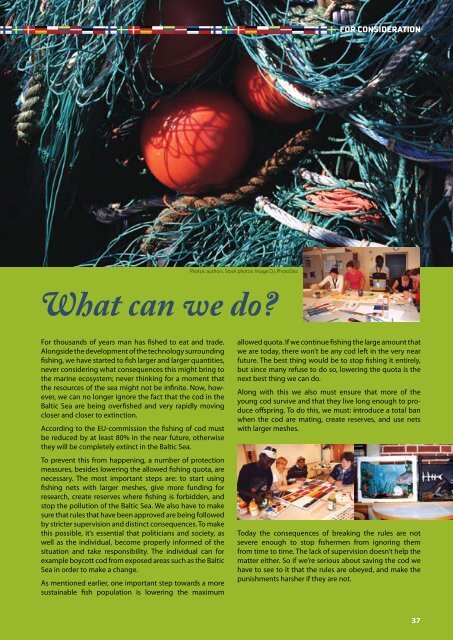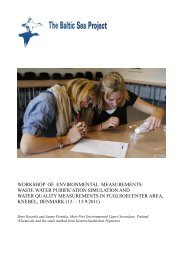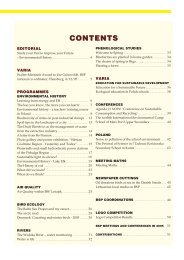newsletter_2008_1.pdf - 5.84 MB - The Baltic Sea Project
newsletter_2008_1.pdf - 5.84 MB - The Baltic Sea Project
newsletter_2008_1.pdf - 5.84 MB - The Baltic Sea Project
Create successful ePaper yourself
Turn your PDF publications into a flip-book with our unique Google optimized e-Paper software.
For thousands of years man has fished to eat and trade.<br />
Alongside the development of the technology surrounding<br />
fishing, we have started to fish larger and larger quantities,<br />
never considering what consequences this might bring to<br />
the marine ecosystem; never thinking for a moment that<br />
the resources of the sea might not be infinite. Now, however,<br />
we can no longer ignore the fact that the cod in the<br />
<strong>Baltic</strong> <strong>Sea</strong> are being overfished and very rapidly moving<br />
closer and closer to extinction.<br />
According to the EU-commission the fishing of cod must<br />
be reduced by at least 80% in the near future, otherwise<br />
they will be completely extinct in the <strong>Baltic</strong> <strong>Sea</strong>.<br />
To prevent this from happening, a number of protection<br />
measures, besides lowering the allowed fishing quota, are<br />
necessary. <strong>The</strong> most important steps are: to start using<br />
fishing nets with larger meshes, give more funding for<br />
research, create reserves where fishing is forbidden, and<br />
stop the pollution of the <strong>Baltic</strong> <strong>Sea</strong>. We also have to make<br />
sure that rules that have been approved are being followed<br />
by stricter supervision and distinct consequences. To make<br />
this possible, it’s essential that politicians and society, as<br />
well as the individual, become properly informed of the<br />
situation and take responsibility. <strong>The</strong> individual can for<br />
example boycott cod from exposed areas such as the <strong>Baltic</strong><br />
<strong>Sea</strong> in order to make a change.<br />
As mentioned earlier, one important step towards a more<br />
sustainable fish population is lowering the maximum<br />
Photos: authors. Stock photos: Image DJ, PhotoDisc<br />
What can we do?<br />
FOR cOnsIDERATIOn<br />
allowed quota. If we continue fishing the large amount that<br />
we are today, there won’t be any cod left in the very near<br />
future. <strong>The</strong> best thing would be to stop fishing it entirely,<br />
but since many refuse to do so, lowering the quota is the<br />
next best thing we can do.<br />
Along with this we also must ensure that more of the<br />
young cod survive and that they live long enough to produce<br />
offspring. To do this, we must: introduce a total ban<br />
when the cod are mating, create reserves, and use nets<br />
with larger meshes.<br />
Today the consequences of breaking the rules are not<br />
severe enough to stop fishermen from ignoring them<br />
from time to time. <strong>The</strong> lack of supervision doesn’t help the<br />
matter either. So if we’re serious about saving the cod we<br />
have to see to it that the rules are obeyed, and make the<br />
punishments harsher if they are not.<br />
37





